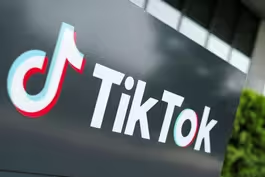
Brooks and Marcus on what's next for the FBI under Trump
Clip: 12/13/2024 | 10m 58sVideo has Closed Captions
Brooks and Marcus on Wray's resignation and what's next for the FBI
New York Times columnist David Brooks and Washington Post columnist Ruth Marcus join Amna Nawaz to discuss the week in politics, including FBI Director Christopher Wray’s announcement that he will be stepping down, what to expect from the FBI under Kash Patel and what Trump voters are expecting from his second term.
Problems playing video? | Closed Captioning Feedback
Problems playing video? | Closed Captioning Feedback
Major corporate funding for the PBS News Hour is provided by BDO, BNSF, Consumer Cellular, American Cruise Lines, and Raymond James. Funding for the PBS NewsHour Weekend is provided by...

Brooks and Marcus on what's next for the FBI under Trump
Clip: 12/13/2024 | 10m 58sVideo has Closed Captions
New York Times columnist David Brooks and Washington Post columnist Ruth Marcus join Amna Nawaz to discuss the week in politics, including FBI Director Christopher Wray’s announcement that he will be stepping down, what to expect from the FBI under Kash Patel and what Trump voters are expecting from his second term.
Problems playing video? | Closed Captioning Feedback
How to Watch PBS News Hour
PBS News Hour is available to stream on pbs.org and the free PBS App, available on iPhone, Apple TV, Android TV, Android smartphones, Amazon Fire TV, Amazon Fire Tablet, Roku, Samsung Smart TV, and Vizio.
Providing Support for PBS.org
Learn Moreabout PBS online sponsorshipAMNA NAWAZ: FBI Director Chris Wray's announcement that he will be stepping down early in his 10-year term and before Donald Trump returns to office in January has sparked debate over how he should have handled his departure.
On that and the other major news shaping the presidential transition, we turn to the analysis of Brooks and Marcus.
That is New York Times columnist David Brooks and Ruth Marcus, associate editor for The Washington Post.
Jonathan Capehart is away.
Great to see you both.
RUTH MARCUS, Associate Editor, The Washington Post: Hi.
AMNA NAWAZ: Let's start with Wray's decision.
And I want to just play for you a little bit of the comments that he made to the bureau in which he announced his decision to step down in January, before Donald Trump could fire him.
Take a listen.
CHRISTOPHER WRAY, FBI Director: In my view, this is the best way to avoid dragging the bureau deeper into the fray, while reinforcing the values and principles that are so important in how we do our work.
AMNA NAWAZ: David, how does leaving early in a 10-year term to avoid the incoming president firing you, how does that keep the bureau out of the political fray?
DAVID BROOKS: Beats me.
DAVID BROOKS: Somebody said he had -- Wray had no good options and he happened to choose the wrong one, the worst of all the options.
And so people have worked hard over decades to make the FBI reasonably nonpolitical.
And that's important, because the FBI is this tremendously powerful organization, which is easily abused as we saw in the era of J. Edgar Hoover.
And so that we have these 10-year terms.
And the idea is that FBI director does not turn over with the president, because we are building safeguards to depoliticize the agency.
And if Donald Trump wants to ruin that, then he should aggressively have to fire Wray, and we should have that fight.
And to basically open the door to what Donald Trump wants to do seems to me not the right way to keep our institutions normal.
AMNA NAWAZ: Ruth, as you probably saw, veteran reporter Jim Fallows, who writes a Substack on journalism and democracy, had this to say.
He wrote: "Eventually, Trump would have found a way to fire Wray.
OK, Wray should have made him do so rather than removing himself."
He said: "Wray has done great damage with his decision and deserves to be scorned."
In your column, you wrote this: "Protecting the bureau and protecting the country would be better achieved by standing up to Trump, not enabling him."
It seems like you agree with what David is saying.
RUTH MARCUS: I 100 percent agree with David on this one.
This is, should be and has been an apolitical job.
No one was fired, except for one person who was scorned by the Bush administration and then fired by the Clinton administration after an extensive finding of wrongdoing that might now look minor in comparison to some of the things that we have seen, until Donald Trump came along.
Now he has done it twice, but he hasn't had -- but Wray capitulated in advance.
He obeyed in advance.
And he allowed Donald Trump to shatter yet another norm without imposing any cost on him.
And that's separate and apart from the caliber of the person that Donald Trump wants to replace him with.
He could want to replace him with Bob -- bring Bob Mueller back, and I think both of us would have the same attitude, which is this is not an ordinary political appointment and it should not be transformed into one.
But here we are.
AMNA NAWAZ: So this does all but clear the path for Kash Patel, who is Trump's nominee to lead the FBI.
He has pledged to reform the bureau.
He has published a list of enemies in his book.
David, do you see anything standing in the way of Kash Patel's confirmation right now?
DAVID BROOKS: Probably not his confirmation.
The senators that he's met with -- he hasn't met with some of the swings, the key senators, Lisa Murkowski, Susan Collins, Mitch McConnell, but the ones he's met with, which is now in the teens, they seem fine.
And my own reading of the situation is that the Republicans, if there are dissenters, he's probably the third priority.
I imagine RFK and Pete Hegseth at Defense are probably higher priorities.
RUTH MARCUS: And Tulsi Gabbard.
DAVID BROOKS: And Tulsi Gabbard.
OK, I'm sorry.
I don't want to underestimate these things.
But -- so I imagine he will be there.
I think what I'm curious about, in a ghoulish way, is how effective he will be or how effective any of these people will be.
I once asked a president in his last week in office, what did you learn being president that you didn't know beforehand?
And he said, there's a lot of passive-aggressive behavior in government.
(LAUGHTER) DAVID BROOKS: I give an order, nothing happens.
And the bureaucracies have that ability to just do nothing happens.
Kash Patel wants to get rid of the headquarters of the FBI, he said, on day one.
AMNA NAWAZ: Yes.
DAVID BROOKS: Really?
You really think you will have the ability to do that?
So I don't think we're going to see much political opposition.
I'm just intensely curious how the agencies themselves respond when these sorts of people lead them.
AMNA NAWAZ: Well, Ruth, for this specific agency, when you take Wray stepping down early and Kash Patel potentially taking that job, what does that mean for the future of the bureau?
What does that look like under the next Trump administration?
RUTH MARCUS: Well, reed Kash Patel's book.
He has his handy-dandy enemies list in Appendix B.
He does make this crack about closing down the headquarters.
We shall see.
It is going to be very difficult and appropriately difficult, because the men and women of the FBI are professionals and sworn to uphold the standards of law enforcement, which means it can't be Kash Patel says, go investigate David Brooks, and they go investigate David Brooks.
They have to have a predicate to do that.
There are standards for what that predicate means.
But hoping that that -- those standards can hold up against a sustained political onslaught across the board is a very dicey situation.
And it's why, while I agree with David's grim prognosis about the likelihood of Kash Patel being confirmed, that is, he will be, probably will be confirmed, I think it's very unfortunate that we're here.
AMNA NAWAZ: I want to get both of your takes now on some new polling, because Americans are looking at some of Trump's nominations.
And about half of all U.S. adults in one poll say they're not at all confident in him of picking well-qualified people.
When they look -- when you look at his defense secretary pick of Pete Hegseth, some 17 percent said they approve of the pick, 36 percent disapprove, 11 percent say neither.
On his pick for Health and Human Services, that's RFK Jr., about 30 percent approve, 42 percent disapprove, 14 percent said neither.
David, what do you take away from those numbers?
DAVID BROOKS: Well, if you had 17 percent said Hegseth and RFK Jr. in the 30s, that means a lot of people who voted for Donald Trump are not on board with these guys.
And that to me is the big -- a big story to watch in the weeks ahead, which is -- my colleague David French put it this way.
There are 17 million Republicans who voted for Trump in the primaries.
But there are I think 74 now million people who voted for him in the general election.
There's a big difference between those 17 who were the hardcore MAGA and that 74.
And a lot of people in that larger group, they didn't vote for this.
They voted to get the -- back to the economy of 2019.
And so, to me, what will be interesting is, as Trump overreads his mandate, how much public outcry is there?
When he tries to deport people who have been living in this country for decades, how much outcry is there?
And I happen to think that the public opinion will serve as a break on Trump.
I think the bond markets and the stock markets will serve as a break on Trump when he does stuff that's not financially foolish.
But the bottom line is, there's going to be no internal resistance, which is unlike any other administration we have covered.
But I'm thinking there will be external resistance from people who didn't sign up for all this stuff.
AMNA NAWAZ: Ruth, what do you make of that?
RUTH MARCUS: Maybe some, and because I think for this reason.
People signed -- the Trump voters signed up for disruption, but I don't know if they signed up for this much disruption.
They signed up for disruption, but they didn't know it was going to be named Matt Gaetz and Tulsi Gabbard and RFK Jr. and Pete Hegseth, and I'm running out of breath as I'm going through the list of all of them.
And one thing that was striking in that poll was that includes Republicans.
I think two out of 10 Republicans said they had little to no confidence in Trump's choices.
And another two out of 10, so four out of 10, said they had little to no or only moderate confidence in Trump's choices.
And those are his voters.
AMNA NAWAZ: There's this other moment we're in that I want to ask you about.
You saw the conversation William just had on the heels of the UnitedHealthcare CEO Brian Thompson's murder.
We have now seen his alleged killer become sort of a folk hero of sorts online, and not in the dark corners of the Internet, out loud, in the open, in mainstream discourse.
I'm just curious what you make of that conversation and what you're thinking as you're watching it unfold, David.
DAVID BROOKS: Oh, it's reprehensible.
And saying UnitedHealthcare mistreats people is not an excuse.
This is beyond the bounds.
This is a time for clear message.
We don't kill people in this country.
I'm struck by the class dynamics of this thing, where the -- Brian Thompson was a kid who grew up, his mom worked in a -- has a beauty salon.
His dad worked for 40 years in a grain elevator.
He grows up, he goes to Ohio state -- or Iowa State.
Excuse me.
And so he comes from, like, a middle-class background.
And he's the elitist?
But the kid who grew up in a fancy real estate family, who went to a fancy prep school in Baltimore, who has two Ivy League degrees, that kid's the populist outsider?
It seems almost a cartoon of the way some of our politics have drifted with progressive elites on the very extremes going off the fringes.
And I will just say one thing about UnitedHealthcare.
I have had my family denied coverage by UnitedHealthcare.
I have no love for them.
But it is just a simple fact that their margin, their profit margin is 6 percent, which is low by any corporate standards.
Other people in that industry, they have margins of 1 percent.
The people who are driving up health care costs in this country are, frankly, not the insurance companies.
They're the providers.
It's the hospitals, the doctors.
And if you want to be mad at somebody for all these health care costs and the mess our system is, maybe spread some of the rage around.
AMNA NAWAZ: I know we could have a much longer conversation about this.
But, Ruth, I want to make sure we get your take on this as well.
RUTH MARCUS: Well, David said, spread some of the rage around.
One of the things that alarms me here is the degree of rage.
We have all had our moments of rage against the health care machine and our frustrations with coverage.
But I worry that the lionization of this obviously disturbed young man and the apparent glee with which some people are treating his behavior and this cold-blooded murder, apparently cold-blooded murder, is illustrative not just of anger at the health care system, but anger more broadly.
And we're kind of road rage nation.
And that should scare all of us.
AMNA NAWAZ: Ruth Marcus, David Brooks, always good to speak with you both.
Thank you so much.
Amy Sherald on the gaze and humanity of her portraits
Video has Closed Captions
Clip: 12/13/2024 | 6m 48s | Amy Sherald on the gaze and humanity of her portraits (6m 48s)
Former ambassador outlines future role of Syria's neighbors
Video has Closed Captions
Clip: 12/13/2024 | 7m 29s | Former ambassador outlines role Syria's neighbors could play in its future (7m 29s)
Murder reveals simmering anger with U.S. health care system
Video has Closed Captions
Clip: 12/13/2024 | 6m 47s | CEO murder reveals simmering anger with American health care system (6m 47s)
Syrians jubilant in first Friday prayers after Assad
Video has Closed Captions
Clip: 12/13/2024 | 5m 36s | Syrians express jubilation during first Friday prayers since overthrow of Assad (5m 36s)
Why an investor thinks TikTok will be safer with U.S. owners
Video has Closed Captions
Clip: 12/13/2024 | 6m 42s | Investor explains why he thinks TikTok will be safer with U.S. ownership (6m 42s)
Providing Support for PBS.org
Learn Moreabout PBS online sponsorship
- News and Public Affairs

FRONTLINE is investigative journalism that questions, explains and changes our world.

- News and Public Affairs

Amanpour and Company features conversations with leaders and decision makers.












Support for PBS provided by:
Major corporate funding for the PBS News Hour is provided by BDO, BNSF, Consumer Cellular, American Cruise Lines, and Raymond James. Funding for the PBS NewsHour Weekend is provided by...




